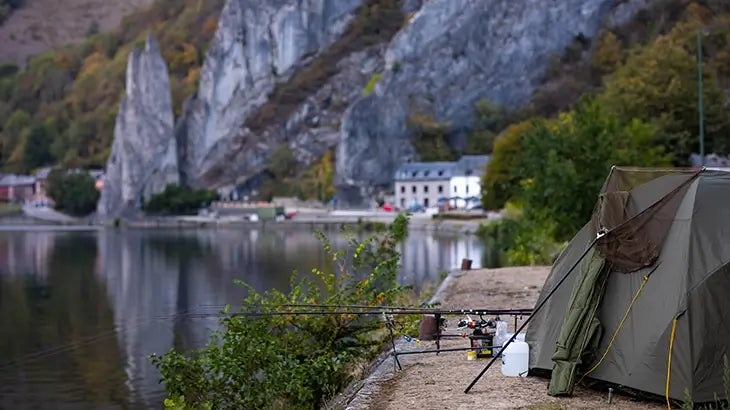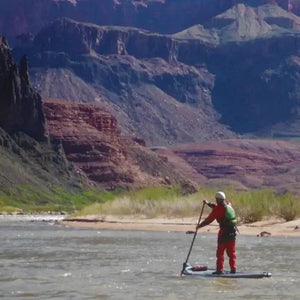5 Tips for Fishing While Camping (for Beginners)
October 26, 2022

Are you preparing for an upcoming fishing and camping trip? Learn five tips and tricks for having the safest, easiest, most fun experience possible.
In this article, we’ll cover five things to do that will help keep your camping trip safe, simple, and fun while you catch and cook any kind of fish.
For a dedicated fisherman, the only thing better than a day spent fishing is a night spent under the stars, stomach full of the fish you just caught. Combining a fishing jaunt with a camping trip is one of the best ways to recapture an old-school sense of adventure, to feel self-sufficient and independent from the modern world. That modern world, however, does still have a lot to offer, especially in terms of knowledge, communication, and access to information, that can help make your escape from it easier, smoother, and safer. In this article, you’ll learn the five best things you can do to make sure you have the best fishing and camping experience.
-
Store your fish carefully wherever you’re staying overnight. Overnight food storage is one of the most important safety considerations while camping, as improperly stored food can attract all sorts of animals, from irritating bugs and squirrels to genuinely dangerous coyotes and bears. You’ll want to look up what animals are common in the area where you’re camping, and be sure to consult with the park or camping area’s regulations and advice for animal-proof storage ideas. If you’re camping in a more developed area, your campsite may already have a bear-proof box installed, or you might be able to drive your own up to the campsite. Storing your food in your car is also a good option, although bears in some parks have learned how to break into cars to look for food. If you can’t use a sealable container, your best option is a bear hang, suspending your fish, fishing supplies, and anything else that might smell like fish or food at least 10 feet in the air, 10 feet away from a tree trunk. However you choose to store your food and fishing supplies, remember to cook at least 50 feet away from where you’re sleeping, to ensure any animals that do find your campsite don’t actually find you.
-
Plan how you’ll cook the fish ahead of time. Before you decide on how you want to cook your fish, you’ll need to consult the regulations and permitting requirements of the place you intend to camp. Some parks and recreation areas may discourage you from carrying in a propane stove or require a permit to have an open campfire. If possible, check if the campsite you’re planning to use has a fire ring or fire pit; if there isn’t or you’re not sure, brush up on how to make your own. Or come prepared with a high quality camping stove. It’s also a good idea to refresh your knowledge of building, lighting, and damping a fire, as well as some basic fire safety. Never squat around a fire, and make sure you always have a supply of water on hand to put it out if it gets out of hand or you’re going to bed. You’ll also want to double-check that you have all the supplies necessary for your chosen cooking method, whether that means bringing a pan and some oil, a grill to balance it on, or roasting spits. Before you leave, make sure you know how long your fish will take to cook, how you’ll need to prep them ahead of time, and how you can tell if they’re fully cooked – the only thing worse than food poisoning is food poisoning miles from the nearest flush toilet.
-
Have an emergency plan and first aid kit prepared before heading out. This is good advice for any camping trip, especially if you’re planning to head into the backcountry, or anywhere where there won’t be cell service or a lot of people around to immediately get help. For fishermen, though, it’s especially important because of the increased risk that comes from being in and around large bodies of water. Research any lakes or rivers you intend to fish in ahead of time, so you’re aware of common hazards and potentially dangerous weather patterns. If you’re going out on a lake where it might take a long time to get back to shore, stay close to land and watch the weather closely. Check the conditions of any rivers you intend to fish or wade in; if they’re running high from snowmelt or recent rainfall, consider rescheduling your trip. Bring a first aid kit, shock blankets, a CPR mask, and lifejackets, and always make sure someone knows where you are and you have a way to contact help if something goes wrong.
-
Bring extras and backups of all your fishing supplies. This is standard procedure for most fishing trips, but it becomes doubly important while camping. When you’re far away from the nearest general store or sports supply, you’re pretty badly out of luck if all your fishing line snaps or you drop a container of live bait and it all wriggles away. David Thomas from everything fishkeeping recommends “if you can, consider even packing in an extra fishing pole, or at least the supplies to repair one”.
- Pack in food in case you don’t catch anything. No matter how skilled you are as an angler, the wild is unpredictable, and one of the thrills of fishing is not knowing what or how much you’ll catch. A smart camper will be prepared for the possibility that they don’t catch anything at all, and will pack in the supplies for a hearty, filling dinner just in case that happens. The last thing you want is to have to hike out of a disappointing fishing trip on an empty stomach. Backpackers, especially, always want to reduce the amount of supplies they’re carrying, but food is one thing you don’t want to skimp on. The extra weight will be worth it when you’re facing a setting sun and another empty line.
Fishing while camping is a grand adventure, and a wonderful opportunity to explore your ability to live off the land and sustain yourself with the fruits of the wild. That doesn’t mean you can just throw caution to the winds, however, and an appropriate amount of planning, preparation, and smart packing will go a long way toward making your trip the safest, most enjoyable adventure it can be.
Time for some new Camping Gear? Outdoorplay has you covered. Shop our huge range of camping tents, single wall tents, sleeping bags, water purifiers, camping chairs & more!

